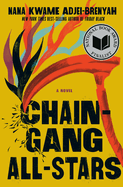
In his powerful, imaginative debut novel, Chain-Gang All-Stars, Nana Kwame Adjei-Brenyah (Friday Black) brilliantly exposes the for-profit infrastructure that exploits the incarcerated, as the larger-than-life characters stir compassion in readers. The titular all-stars have signed away their right to privacy, to their names, to their physical likenesses, to compete in gladiator-style fights to the death--televised nationwide. If, after three years, they survive these BloodGround contests, they go free, no matter the length of their sentence.
Loretta Thurwar, in her first contest, upsets the reigning favorite with a mere corkscrew. Eventually, she works her way up from Rookie to highest-rank Grand Colossal. If the situations seem farfetched, such as Grand Colossal Thurwar's "Question Mark" match against 16-year-old prisoner Teacup, they're not; footnotes lay out historical facts: George Stinney, Jr., was executed at age 14 in 1944.
Like the small HMC EyeBall cameras that hover around the all-stars, Adjei-Brenyah moves among their perspectives, as well as those who run the games and the Coalition to End Neo-Slavery. These HMCs (one of several technological marvels of Adjei-Brenyah's world building) record prisoners' most intimate moments, even Thurwar and fellow female inmate Staxxx making love. Tension builds as Staxxx does something Thurwar finds unthinkable; Thurwar keeps a secret; and protests escalate.
Adjei-Brenyah pulls no punches in the parallels he draws between incarceration and slavery, unpaid labor and power imbalance. His story may be fiction, but he delivers the truth. --Jennifer M. Brown, senior editor, Shelf Awareness

